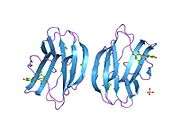Galectin-1
Galectin-1 is a protein that in humans is encoded by the LGALS1 gene.[1][2]
Gene and protein
LGALS1 contains four exons. The galectin-1 protein is 135 amino acids in length and highly conserved across species. It can be found in the nucleus, the cytoplasm, the cell surface and in the extracellular space. Galectins in general lack a traditional signal sequence, but are still secreted across the plasma membrane. This non-traditional secretion requires a functional glycan binding site. Galectin 1 contains a single carbohydrate recognition domain through which it can bind glycans both as a monomer and as a homodimer. Dimers are non-covenantly bound and will spontaneously disassociate in low concentration.[3] Galectin 1 does not bind glycans when oxidized.[4] Having 6 cysteine residues, the oxidation state has a significant effect on the protein structure. The oxidized form is reported to have alternative functions not involving carbohydrate binding.[5]
Function
The galectins are a family of beta-galactoside-binding proteins implicated in modulating cell-cell and cell-matrix interactions. Galectin-1 may act as an autocrine negative growth factor that regulates cell proliferation.[6] Galectin-1 expression in Hodgkin Lymphoma has also been shown to mediate immunosuppression of CD8+ T-cells.[7]
Role in pregnancy
Galectin-1 is thought to play a role in creating immune tolerance in pregnancy.[8] Galectin-1 is expressed by the endometrial stromal cells throughout the menstrual cycle, however significantly increases during implantation. Galectin-1 induces the differentiation of Dendritic cells towards a phenotype which dampens T helper 1 cells and T helper 17 cells and dampens inflammation via interleukin-10 and interleukin-27.[9] It also plays a role in the formation and expression of HLA-G in the syncytium.[10]
Interactions
LGALS1 has been shown to interact with GEMIN4[11] HRAS.[12]
See also
References
- ↑ Gitt MA, Barondes SH (February 1991). "Genomic sequence and organization of two members of a human lectin gene family". Biochemistry 30 (1): 82–9. doi:10.1021/bi00215a013. PMID 1988031.
- ↑ Gauthier L, Rossi B, Roux F, Termine E, Schiff C (October 2002). "Galectin-1 is a stromal cell ligand of the pre-B cell receptor (BCR) implicated in synapse formation between pre-B and stromal cells and in pre-BCR triggering". Proc Natl Acad Sci U S A 99 (20): 13014–9. doi:10.1073/pnas.202323999. PMC 130578. PMID 12271131.
- ↑ Cho M, Cummings RD (1995). "Galectin-1, a beta-galactoside-binding lectin in Chinese hamster ovary cells. I. Physical and chemical characterization". J. Biol. Chem. 270 (10): 5198–206. doi:10.1074/jbc.270.10.5198. PMID 7890630.
- ↑ Outenreath RL, Jones AL (1992). "Influence of an endogenous lectin substrate on cultured dorsal root ganglion cells". J. Neurocytol. 21 (11): 788–95. doi:10.1007/bf01237904. PMID 1431997.
- ↑ Kadoya T, Horie H (2005). "Structural and functional studies of galectin-1: a novel axonal regeneration-promoting activity for oxidized galectin-1". Curr Drug Targets 6 (4): 375–83. doi:10.2174/1389450054022007. PMID 16026256.
- ↑ "Entrez Gene: LGALS1 lectin, galactoside-binding, soluble, 1 (galectin 1)".
- ↑ Gandhi, MK (Aug 15, 2007). "Galectin-1 mediated suppression of Epstein-Barr virus specific T-cell immunity in classic Hodgkin lymphoma.". Blood 110 (4): 1326–9. doi:10.1182/blood-2007-01-066100. PMID 17438085.
- ↑ Munoz-Suano A, Hamilton AB, Betz AG (May 2011). "Gimme shelter: the immune system during pregnancy". Immunol. Rev. 241 (1): 20–38. doi:10.1111/j.1600-065X.2011.01002.x. PMID 21488887.
- ↑ Ilarregui JM, Croci DO, Bianco GA, Toscano MA, Salatino M, Vermeulen ME, Geffner JR, Rabinovich GA (September 2009). "Tolerogenic signals delivered by dendritic cells to T cells through a galectin-1-driven immunoregulatory circuit involving interleukin 27 and interleukin 10". Nat. Immunol. 10 (9): 981–91. doi:10.1038/ni.1772. PMID 19668220.
- ↑ Comninos AN, Jayasena CN, Dhillo WS (2014). "The relationship between gut and adipose hormones, and reproduction". Hum. Reprod. Update 20 (2): 153–74. doi:10.1093/humupd/dmt033. PMID 24173881.
- ↑ Park JW, Voss PG, Grabski S, Wang JL, Patterson RJ (September 2001). "Association of galectin-1 and galectin-3 with Gemin4 in complexes containing the SMN protein". Nucleic Acids Res. 29 (17): 3595–602. doi:10.1093/nar/29.17.3595. PMC 55878. PMID 11522829.
- ↑ Paz A, Haklai R, Elad-Sfadia G, Ballan E, Kloog Y (November 2001). "Galectin-1 binds oncogenic H-Ras to mediate Ras membrane anchorage and cell transformation". Oncogene 20 (51): 7486–93. doi:10.1038/sj.onc.1204950. PMID 11709720.
Further reading
| |||||||||||||||||||







